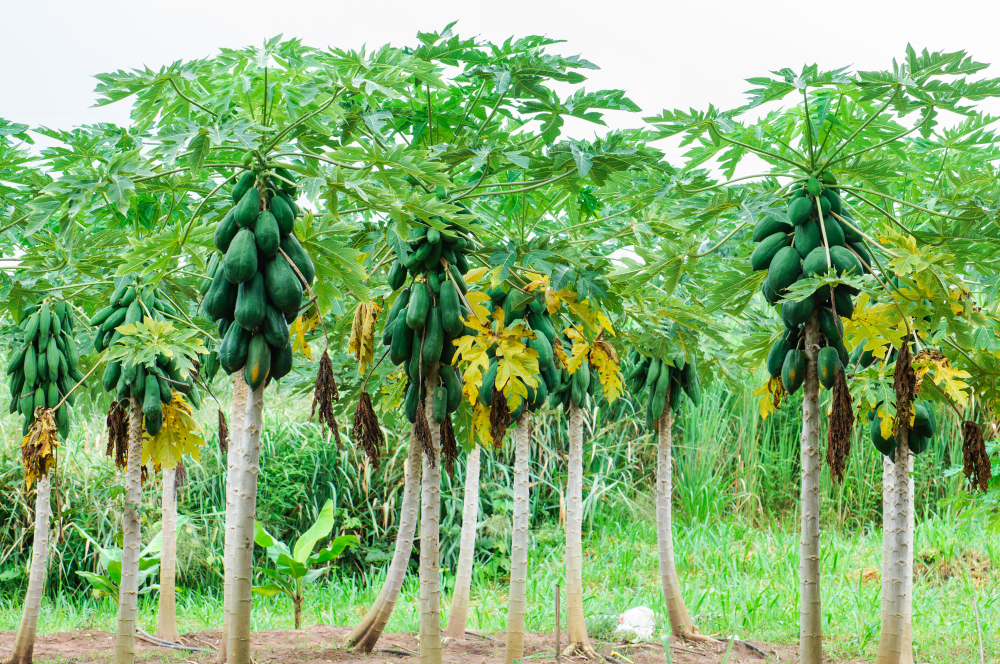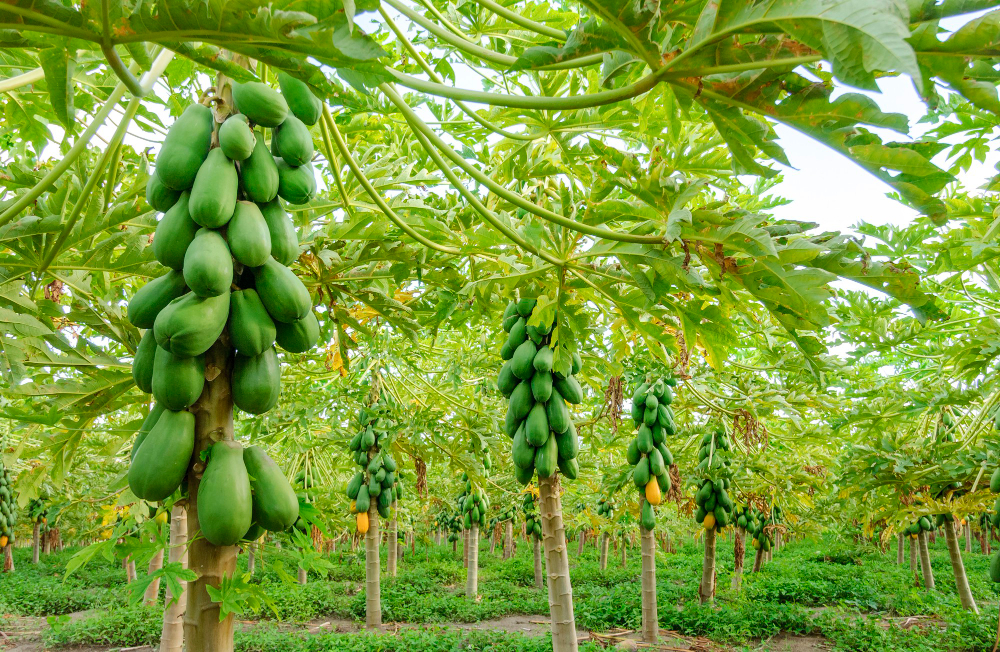Atulya Vanam's Mighty Papaya Tree: A Verdant Pharmacy of Wellness Across Healing Traditions
The Papaya tree (Carica papaya) stands as a beacon of health and vitality, offering an array of therapeutic benefits through its leaves, fruit, bark, roots, and flowers.
In this comprehensive blog, we embark on a revealing journey to explore the myriad uses of the Papaya tree across various medical systems, including Modern Medicine, Ayurveda, Unani, Homeopathy, Siddha, and its versatile applications. Additionally, we delve into the diverse Papaya varieties flourishing in India.
Medicinal Value
Modern Medicine:
Fruit (Papaya): Papaya is celebrated for its rich content of enzymes, vitamins, and antioxidants, contributing to digestive health and immune support.
Papain Enzyme: Papaya’s enzyme, papain, finds application in skincare products and digestive aids.
Ayurveda:
Fruit (Papaya): Ayurveda acknowledges Papaya’s digestive properties and its ability to balance excess pitta dosha.
Leaves and Latex: Papaya leaves and latex are used in Ayurvedic practices for their potential to support digestion and address skin issues.
Unani:
Fruit (Papaya): In Unani medicine, Papaya’s nutritive value is esteemed for enhancing vitality and overall well-being.
Homeopathy:
Fruit (Papaya): While not a primary ingredient, Papaya may be used in homeopathic remedies targeting specific symptoms or health concerns.
Siddha:
Fruit (Papaya): In Siddha medicine, Papaya is believed to have potential in promoting digestion and alleviating ailments.
General Uses
Digestive Aid: Papaya’s enzyme content supports digestion, making it a beneficial addition to meals or as a natural remedy for digestive discomfort.
Skincare and Haircare: Papaya’s enzymes and nutrients are harnessed in skincare products for exfoliation and promoting skin radiance. It’s also used for strengthening hair.
Traditional Remedies: Papaya leaves, bark, and roots are used in traditional remedies for their potential in managing digestive issues and skin ailments.
Culinary Delight: Papaya’s sweet taste and soft texture make it a versatile ingredient in salads, smoothies, and desserts.
Papaya Varieties in India
Red Lady: Known for its vibrant color and sweet taste, Red Lady Papaya is a popular commercial variety.
Solo: Characterized by its smaller size and intense sweetness, Solo Papaya is favored for local consumption.
Washington: Recognized for its large size and mild flavor, Washington Papaya is a preferred choice for export markets.



More about Papaya
Papaya trees (Carica papaya) are fascinating and versatile plants with a range of extraordinary qualities. Here are some intriguing facts about papaya trees:
- Tropical Marvel: Papaya trees thrive in tropical and subtropical climates, making them a staple in regions with warm temperatures.
- Rapid Growth: Papaya trees are known for their rapid growth, with some varieties reaching maturity and producing fruit within a year.
- Multiple Varieties: There are various papaya varieties, each with unique fruit sizes, shapes, and flavors, ranging from sweet to slightly tangy.
- Nutrient Rich: Papaya fruits are rich in vitamins, particularly vitamin C and vitamin A, as well as dietary fiber and minerals like potassium.
- Digestive Enzyme: Papaya contains an enzyme called papain, which aids in digestion and is often used as a meat tenderizer.
- Culinary Diversity: Papaya is consumed both ripe and unripe, with uses ranging from fresh fruit salads and juices to cooked dishes and curries.
- Medicinal History: In traditional medicine, papaya has been used for its potential digestive benefits, wound healing properties, and more.
- Tropical Fruit Salad: Papaya’s vibrant color and refreshing taste make it a popular addition to tropical fruit salads and desserts.
- Skin Care: Papaya enzymes are utilized in skincare products for exfoliation and rejuvenation due to their potential to remove dead skin cells.
- Natural Laxative: Papaya’s fiber content and digestive enzyme papain contribute to its potential as a natural remedy for constipation.
- Gender Determination: Papaya trees have unique properties that allow horticulturists to determine the gender of the tree by examining its flowers.
- Seed Benefits: Papaya seeds are edible and have been used traditionally for their potential antibacterial and antiparasitic properties.
- Culinary Enzyme: Papain, extracted from papaya, is used in the food industry to tenderize meat and is an ingredient in some digestive enzyme supplements.
- Tropical Landscape: The distinctive shape and growth habit of papaya trees make them a popular addition to tropical landscapes and gardens.
- Natural Health Aid: Papaya’s rich nutrient profile has led to its inclusion in various health products, including dietary supplements and herbal teas.
- Propagation Ease: Papaya trees can be grown from seeds and stem cuttings, making them accessible for cultivation.
- Global Presence: Papayas are cultivated in numerous countries and are enjoyed worldwide for their delicious taste and potential health benefits.
These extraordinary facts highlight the versatility of papaya trees, from their rapid growth and culinary diversity to their potential as both a delicious fruit and a source of traditional remedies. Papayas continue to be celebrated for their nutritional value and their contributions to both local cuisine and natural health and beauty practices.
Conclusion
The Papaya tree, a symbol of nourishment and well-being, transcends its role as a bearer of luscious fruit. Its leaves, fruit, bark, roots, and versatile applications intermingle with a diverse array of medical systems and cultural practices. From the ancient wisdom of Ayurveda to the precision of modern science, the Papaya tree’s virtues flourish. By embracing the harmony of traditional knowledge and contemporary exploration, we unveil the countless ways in which the Papaya tree enriches our lives—nurturing not only our bodies but also our cultural heritage and the flourishing abundance of nature.
